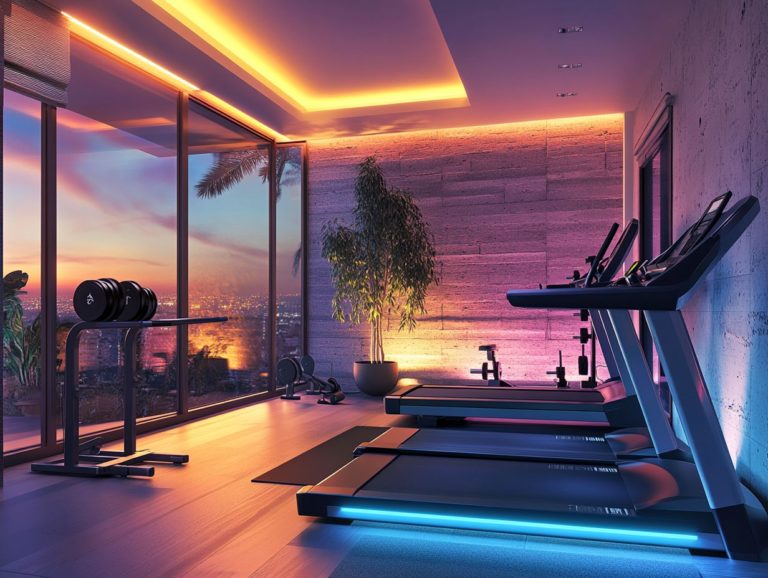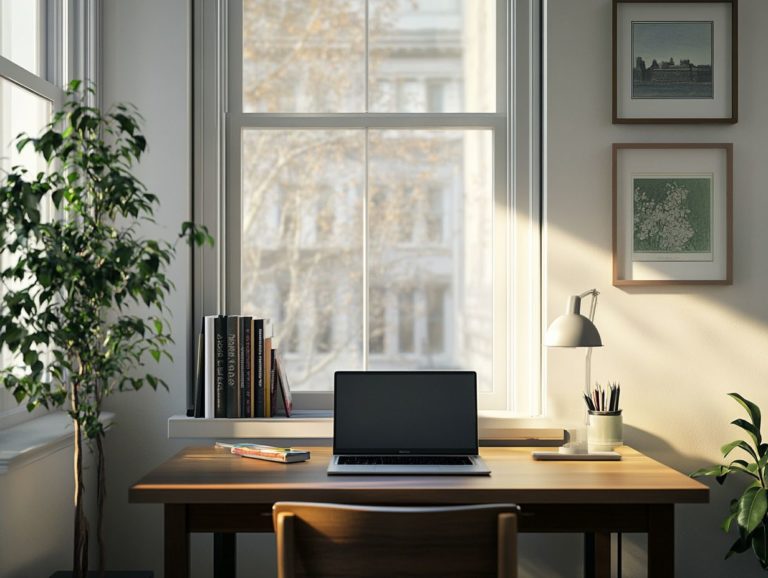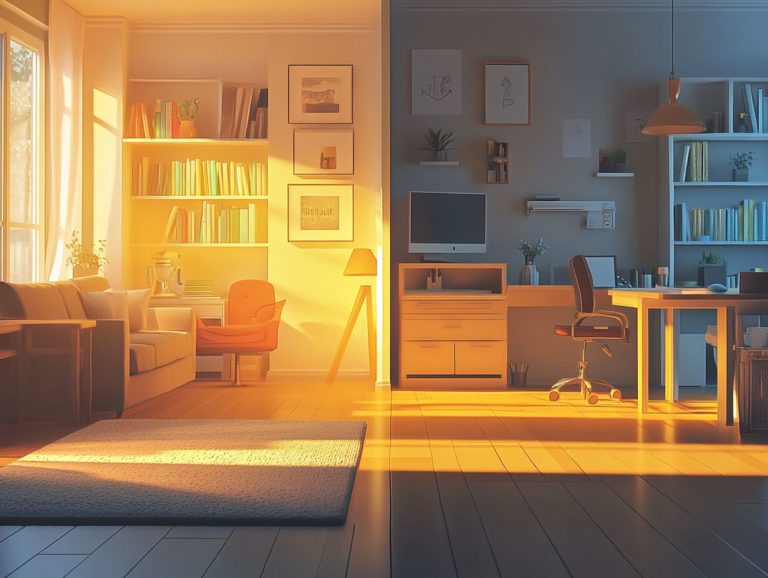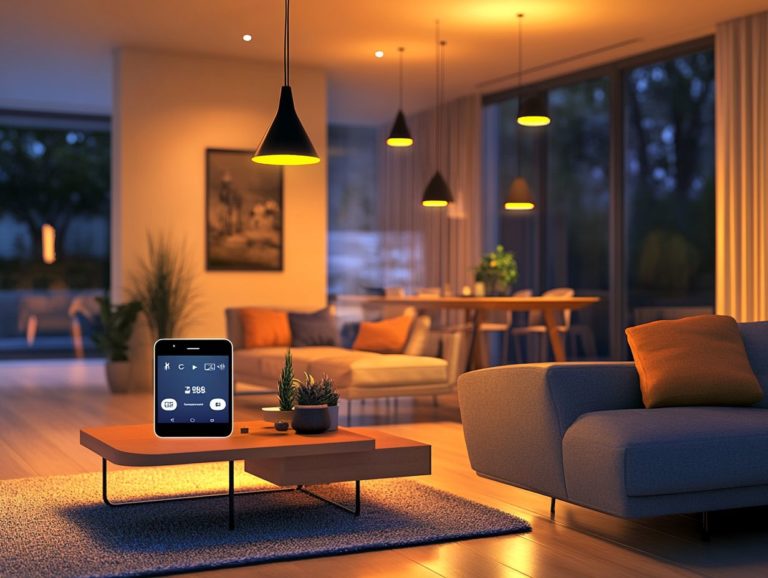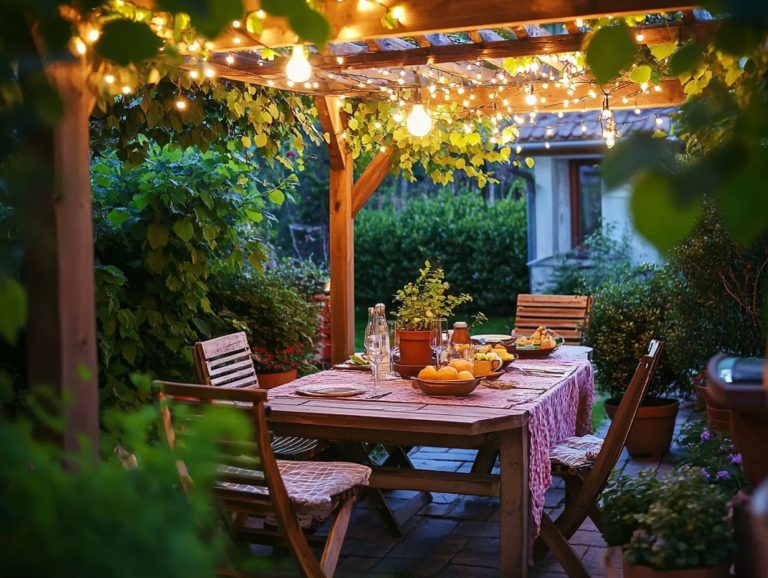“The Role of Lighting in Feng Shui”
Feng Shui, the ancient Chinese art of harmonizing individuals with their surroundings, highlights the vital role of energy flow, or “chi,” which is the energy that flows through our surroundings, within your spaces.
One of the most significant factors in achieving this harmony is lighting. Don’t ignore the power of lighting in your home; it s essential for your well-being!
This article delves into how lighting affects energy flow, distinguishing between natural and artificial light, and guiding you in selecting the ideal illumination for your home. It also reveals common lighting mistakes and offers insights on how to effortlessly align lighting with other Feng Shui principles, creating a balanced and inviting atmosphere.
Contents
- Key Takeaways:
- The Importance of Lighting in Feng Shui
- Types of Lighting in Feng Shui
- How to Use Lighting for Positive Feng Shui
- Common Lighting Mistakes in Feng Shui
- Incorporating Lighting into Feng Shui Design
- Frequently Asked Questions
- What is the importance of lighting in Feng Shui?
- What types of lighting are recommended in Feng Shui?
- How does the placement of lighting impact Feng Shui?
- Can lighting be used to remedy Feng Shui issues?
- What are some tips for using lighting in Feng Shui?
- How can lighting be used to enhance specific areas in Feng Shui?
Key Takeaways:
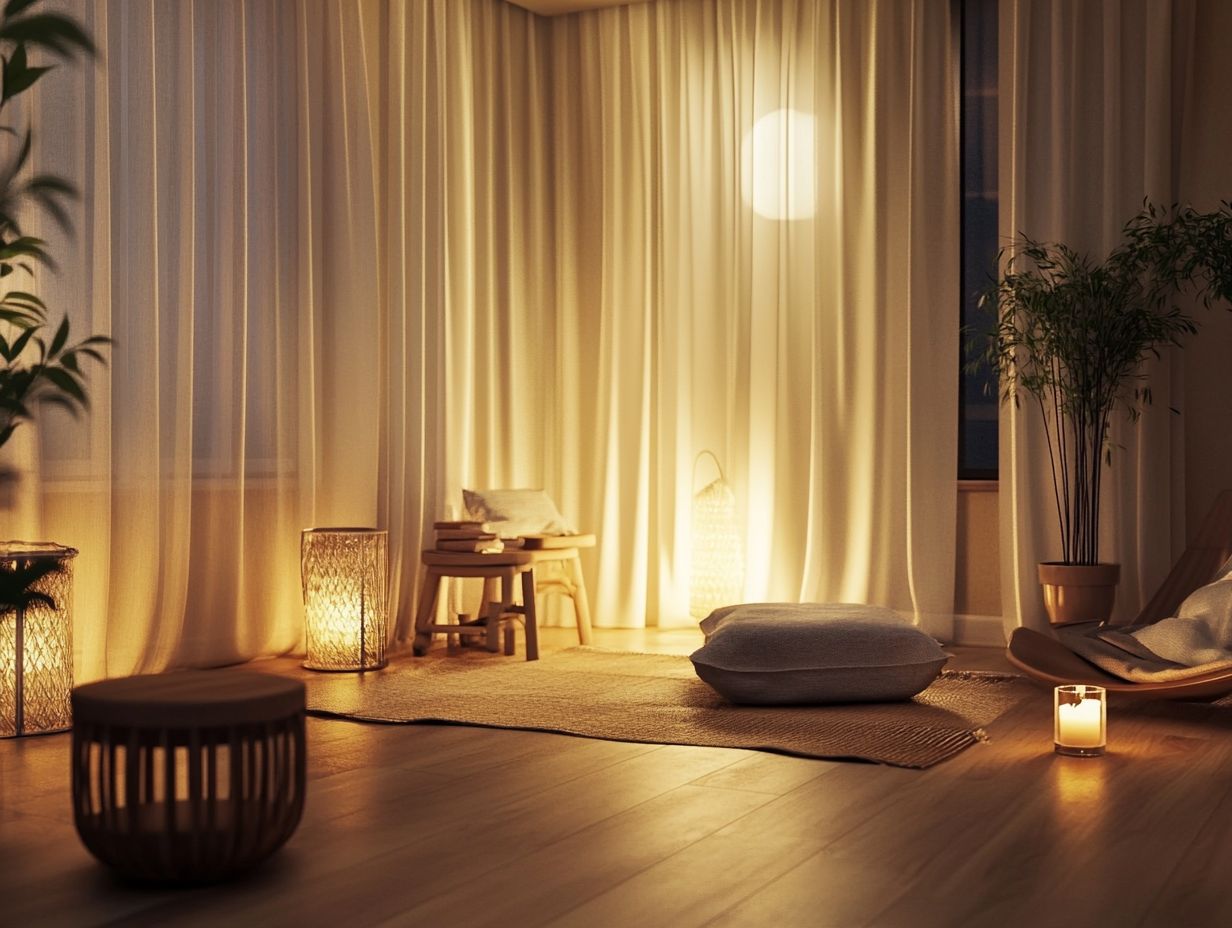
- Lighting plays a crucial role in creating positive energy flow in Feng Shui.
- Both natural and artificial lighting can be used in Feng Shui, but the key is to choose the right type for each room.
- Proper placement and use of lighting can enhance the overall Feng Shui design and promote good energy in your home.
Discover the Magic of Feng Shui!
Feng Shui, an ancient Chinese practice, revolves around the idea that the way you arrange objects in your space can profoundly affect the flow of chi, or life energy. By grasping and applying Feng Shui principles, you can cultivate a harmonious living environment that fosters positive energy and enhances your overall well-being.
This practice emphasizes the balance of the five elements Earth, Fire, Metal, Water, and Wood allowing you to elevate the atmosphere of your home and garden. With thoughtful placement of decorative objects, you can invite tranquility and a sense of protection into your surroundings.
With roots tracing back over 3,000 years, Feng Shui embodies a rich philosophy that mirrors the interconnectedness of the natural world. At its essence, it seeks to optimize the flow of chi, ensuring that energy circulates effectively throughout your space.
By aligning your structures and objects with natural elements, you can create a balance and harmony that promotes health, happiness, and prosperity.
The careful design of buildings, the arrangement of your furniture, and even your choice of colors play crucial roles in shaping an environment that radiates positive energy. In doing so, you create a sanctuary where you can thrive both physically and emotionally.
The Importance of Lighting in Feng Shui
In Feng Shui, you can’t underestimate the significance of lighting; it plays a crucial role in shaping the flow of chi and the overall energy within your space, crafting a balanced environment that nurtures your well-being.
Thoughtfully designed lighting enhances not only the aesthetic charm of your home but also fosters positive emotions, calming atmospheres, and vibrant energy. By skillfully blending natural light with artificial lighting sources, you create a harmonious ambiance that elevates your living experience.
How Lighting Affects Energy Flow
Lighting is essential in shaping the energy flow within your space. The right type can either enhance or disrupt the flow of chi, significantly influencing the overall ambiance and emotional climate of a room.
For instance, soft lighting paired with warm color temperatures fosters a calming atmosphere, while brighter, cooler lights can invigorate a sense of energy and productivity. Your choice of lighting style should align with the intended use of each area.
In spaces meant for relaxation, like bedrooms or reading nooks, combining dimmable fixtures with warm hues promotes tranquility and well-being. On the other hand, areas designed for collaboration and creativity, such as offices or studios, thrive on dynamic lighting solutions that incorporate cooler tones to stimulate focus and innovation.
By grasping how these elements interplay, you can curate an environment that not only captivates the eye but also supports positive energy flow and emotional responses tailored to your specific activities.
Types of Lighting in Feng Shui
Grasping the different types of lighting natural and artificial is crucial in Feng Shui, as each serves a distinct purpose and influences the energy balance within a space.
Thoughtful lighting design embraces a layered approach, merging task lighting, ambient lighting, and decorative fixtures. This strategy allows you to play with diverse color temperatures, creating either a warm, inviting ambiance or a cool, invigorating atmosphere tailored to your needs.
Start today! Assess your lighting and invite positive energy into your space.
Natural vs. Artificial Lighting
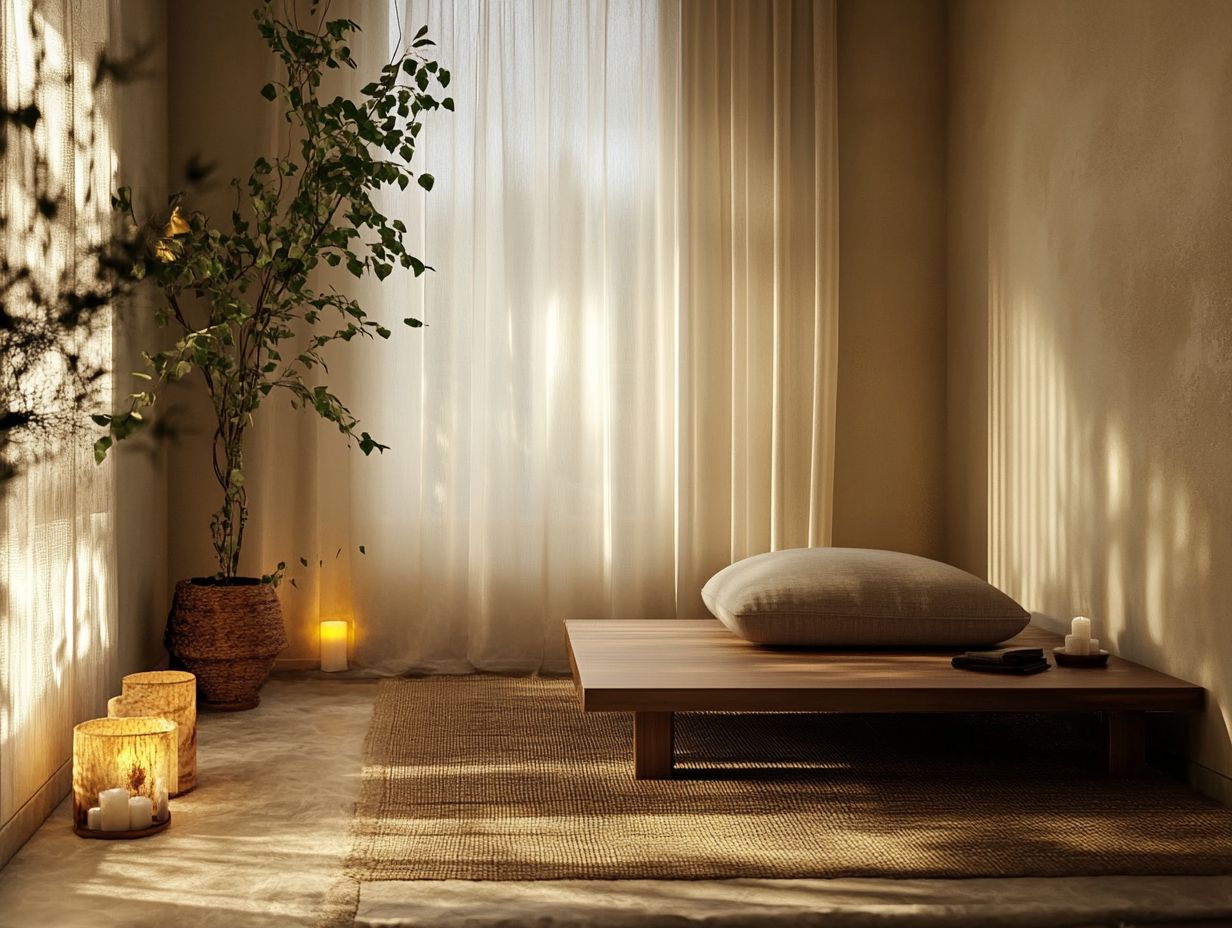
Natural light shapes the energy in your space, influencing the flow of energy, known as chi. It fosters positive energy and promotes well-being.
Artificial lighting can balance areas lacking sunlight. When used thoughtfully, it can mimic the warm qualities of natural light.
The sun’s rays invigorate your surroundings, enhancing feelings of vitality and clarity, aligning perfectly with Feng Shui principles.
Opting for warmer tones in your lamps helps transition smoothly from day to night. This blend of lighting invites flexibility in your design and supports wellness and balance.
Choosing the Right Lighting for Each Room
Choosing lighting for each room involves understanding its specific energy needs. This ensures the lighting enhances the atmosphere, whether it’s a calming vibe in the bedroom or vibrant energy in your workspace.
Layered lighting in living areas encourages social interaction. In the kitchen, bright lights boost alertness, ideal for cooking.
Bathrooms benefit from softer, warmer lights, creating a spa-like retreat. Consider the color temperature and intensity of lighting for best results.
Cooler tones invigorate while warmer shades induce tranquility. Understanding these dynamics helps create a harmonious design that enhances your overall well-being.
How to Use Lighting for Positive Feng Shui
Effective lighting for positive Feng Shui relies on understanding how different placements affect chi flow. This creates a sanctuary that promotes well-being.
Thoughtful choices about lighting styles and arrangements elevate the energy balance in your space. Transform your home into a harmonious retreat today!
Tips and Techniques for Optimal Placement
Proper placement of lighting fixtures enhances chi flow and creates a balanced energy in your home. Improper placement can lead to stagnant energy.
Place lamps in corners to reflect light, and use dimmer switches for adjusting brightness. These techniques enhance the overall atmosphere.
Layer your lighting with a mix of ambient, task, and accent lighting. Avoid bright lights directly above resting areas to create a calming effect.
Ensure light sources illuminate pathways adequately for safety and to guide chi throughout your space. Warmer bulb hues create a cozy, inviting ambiance.
Common Lighting Mistakes in Feng Shui
Finding common lighting mistakes is crucial for cultivating a balanced environment. These mistakes can disrupt energy flow and affect your space’s atmosphere.
Improper placement, harsh lighting, or lack of natural light can hinder the positive energy you want to create. Make adjustments to enhance your well-being!
What to Avoid for Good Feng Shui
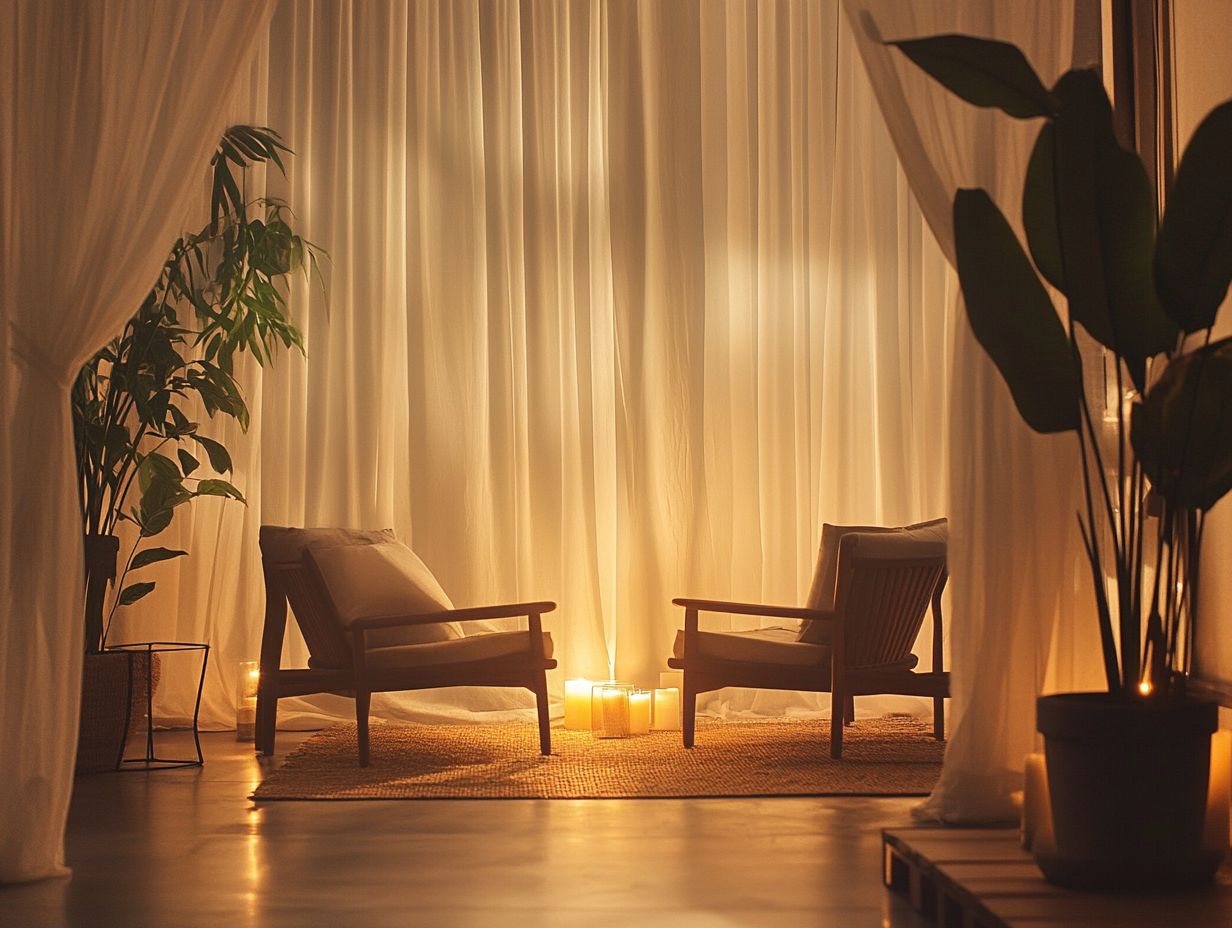
To maintain a harmonious Feng Shui environment, avoid lighting choices that disrupt energy flow. Common errors include harsh lighting, clutter that blocks light, and neglecting the importance of natural and artificial light, which can create unwanted shadows.
Poor lighting can make areas feel stagnant and uninviting. This can ultimately affect your mood and sense of tranquility.
Bright fluorescent lights may enhance visibility, but they often bring a jarring energy that leads to discomfort. Arrange your furniture to avoid blocking windows or light sources, allowing positive energy to circulate freely.
Embrace softer, warmer lighting options and use mirrors strategically. This combination cultivates a harmonious atmosphere that nurtures well-being and enhances energy flow.
Incorporating Lighting into Feng Shui Design
Lighting is vital for achieving harmony between aesthetics and energy flow in your Feng Shui design. Every element should work together to create balance.
Choose lighting fixtures that complement your color choices and decorative objects. This choice enhances the visual appeal and energetic quality of your space.
Integrating Lighting with Other Feng Shui Principles
Lighting works closely with other Feng Shui principles. Understanding how it interacts with various design elements helps meet your energy needs while maintaining balance.
Strategically placed lighting can highlight the natural flow of energy. This significantly influences your emotions and overall well-being in living spaces.
Soft, warm lighting elevates relaxation in restful areas like bedrooms. Brighter lights enhance focus and productivity in workspaces.
Combine lighting with elements such as color, texture, and space arrangement. Use mirrors to reflect light, amplifying effects and creating a sense of openness.
Adopting a holistic approach harmonizes lighting with these elements, elevating aesthetics and cultivating positive energy transitions.
Frequently Asked Questions
What is the importance of lighting in Feng Shui?
The role of lighting in Feng Shui is vital as it affects the flow of energy or Qi in any space. Proper lighting enhances positive energy and creates a harmonious environment.
What types of lighting are recommended in Feng Shui?
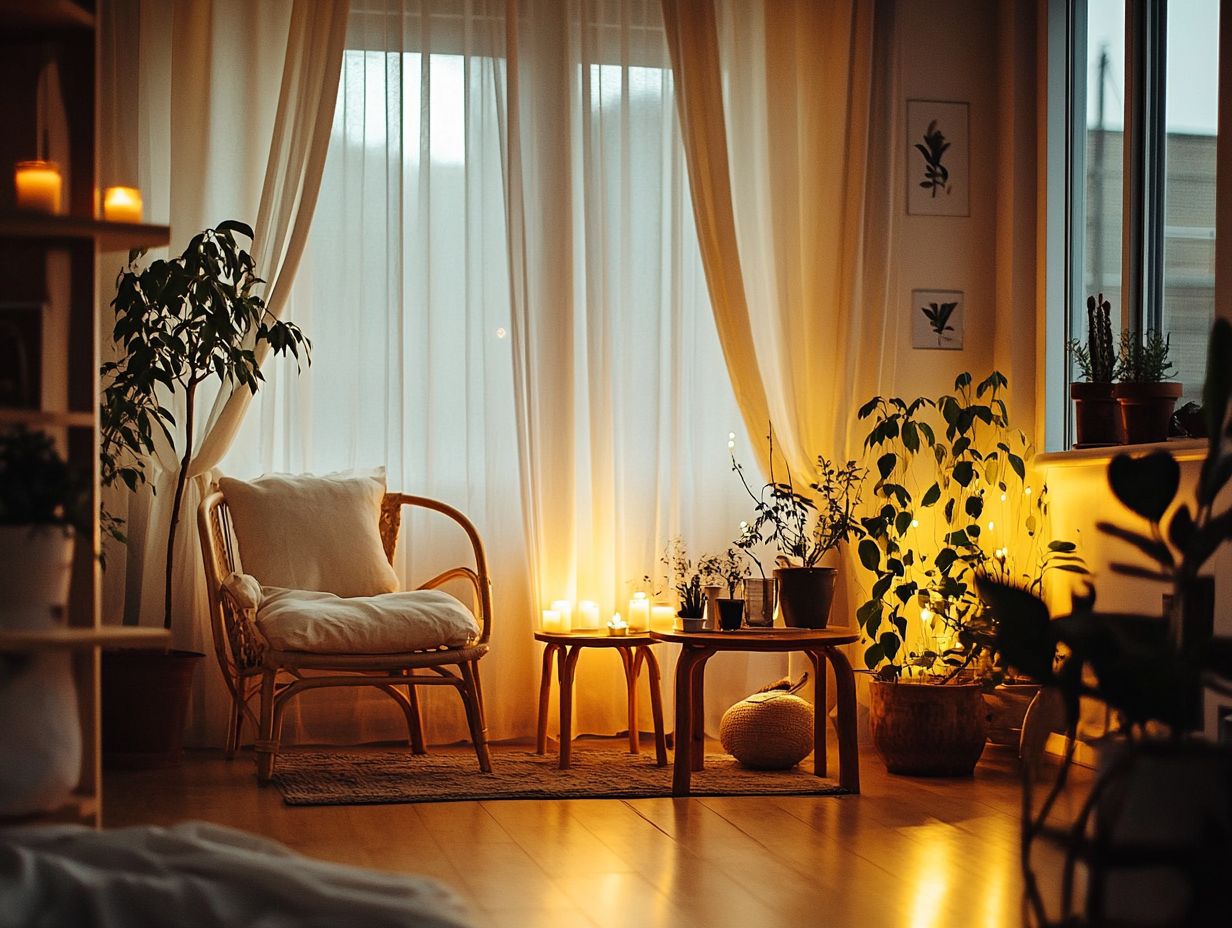
Natural lighting is the best option in Feng Shui, representing the sun’s vibrant energy. If not possible, soft and warm artificial lighting, such as incandescent or LED lights, is preferred over harsh fluorescent lights.
How does the placement of lighting impact Feng Shui?
The placement of lighting is crucial in Feng Shui. Balanced lighting throughout a space ensures no dark or shadowy corners.
Avoid placing lights directly above your head or pointing towards mirrors as this creates harsh energy.
Can lighting be used to remedy Feng Shui issues?
Yes, lighting can remedy certain Feng Shui issues. Dimmer switches adjust room brightness and control energy flow.
Place bright lights in areas lacking natural light to help balance energy in that space.
Ready to enhance your space? Discover the best lighting solutions for your Feng Shui!
What are some tips for using lighting in Feng Shui?
Use warm, soft light bulbs. Incorporate natural light and avoid harsh lighting to keep the ambiance balanced.
Regularly clean and replace burnt-out bulbs. This helps prevent stagnant energy.
How can lighting be used to enhance specific areas in Feng Shui?
Lighting is a powerful tool in Feng Shui. It can transform specific areas of your space into vibrant zones of energy.
For instance, use bright, vibrant lighting in your career area to ignite motivation and success. In the bedroom, soft, calming lighting fosters rest and relaxation.

